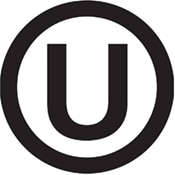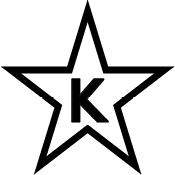Kosher Certification
Kosher is a Hebrew word meaning “fit” or “proper.” When “kosher” is applied to food, it indicates that a food item is fit for consumption according to Jewish law, while the term “kashrus” refers to the general subject of kosher food.
A basic principle of kashrus is complete separation of meat and dairy products; they may not be cooked or eaten together. A kosher kitchen has separate dishes, utensils, cookware and preparation areas for meat and dairy.
Kosher Certification is a process by which a company ensures that their food is kosher—fit for consumption by observant Jews who practice a religious dietary protocol rooted in Jewish biblical tradition. Some kosher food products have the labels which say “U” or “K.”
U Kosher
The use of the letter “U” inside of the letter “O” is authorized by the Union of Orthodox Jewish Congregations of America, more familiarly known as the Orthodox Union, for use on foods that comply with Jewish dietary laws.
The Orthodox Union (OU) is one of the oldest Orthodox Jewish organizations, best known for its kosher certification service. In fact, for over 80 years, the Orthodox Union has set the bar for the highest standards of kosher certification.
The Orthodox Union’s Kosher Division is the world’s largest kosher certification agency. As of 2010, it supervised more than 400,000 products in 8,000 plants in 80 different countries. It employs approximately 1,000 supervisors, known as mashgichim in Hebrew, and about 50 rabbinic coordinators.
The supervision process involves sending a mashgiach to the production facility to ensure that the product complies with halakha (Jewish law). The mashgiach supervises both the ingredients and the production process.
Its circled-U symbol, a hechsher mark, is easily identifiable. A hechsher “kosher approval” is a rabbinical product certification, qualifying items conforming to requirements of the collective body of Jewish religious law.
The OU also supports a network of synagogues, youth programs, Jewish and Religious Zionist advocacy, programs for the disabled, localized religious study programs, and some international units with locations in Israel and formerly in Ukraine.
Star-K Kosher
Star-K Kosher Certification is a kosher certification agency that has provided kosher supervision for over 50 years. As a leader in the international world of kosher certification, it is trusted by many orthodox Jews globally for being dedicated to preserving Kashrus—the state of being kosher according to Jewish dietary law. The tenets of Kashrus (kosher dietary laws) are rooted in the Written and Oral Torah (the Bible). In the post-Biblical era, the Rabbis elaborated upon these laws with explanations, details and organization.
The Jewish religion incorporates within its tenets a regimen of dietary laws. These laws determine which foods are acceptable and conform to the Jewish Code. The word kosher is an adaptation of the Hebrew word meaning “fit” or “proper.” It refers to foodstuffs that meet the dietary requirements of Jewish Law.
The barometer of Kosher and non-Kosher depends on two variables: the source of the ingredients and the status of the production equipment. Kosher certification, which is the guarantee that the food meets kosher requirements, revolves around these two criteria.
Star-K Kosher Certification supervises tens of thousands of food products and food establishments, including restaurants and caterers around the world.
It’s a highly trusted certification for many, since market studies repeatedly indicate that even the non-Jewish consumer, when given the choice, will express a distinct preference for kosher certified products. They regard the kosher symbol as a sign of quality.
Pareve (or Parve) Kosher
The term Pareve, or Parve, refers to “neutral” foods that don’t contain meat or dairy ingredients, or their derivatives. All fruits, grains, vegetables, water and minerals in their natural state are kosher and pareve. Eggs from kosher fowl are pareve, as are fish. Pareve presents fewer kashrut complexities than meat or dairy does, but certain points must still be known, including:
- A pareve item acquires a dairy status when it is mixed together with a dairy food or produced on dairy equipment; it acquires meat status when mixed or cooked with meat or produced on meat equipment.
- Certain fruits, vegetables and grains must be checked for the presence of small insects and larvae, which are not kosher.
- Eggs must be checked for the presence of blood spots, which are not kosher.
OK Kosher Pareve products are labeled with a plain OK Pareve symbol. Pareve products produced on equipment previously used for dairy and not Kosherized are labeled OK D or OK DE (dairy equipment).


